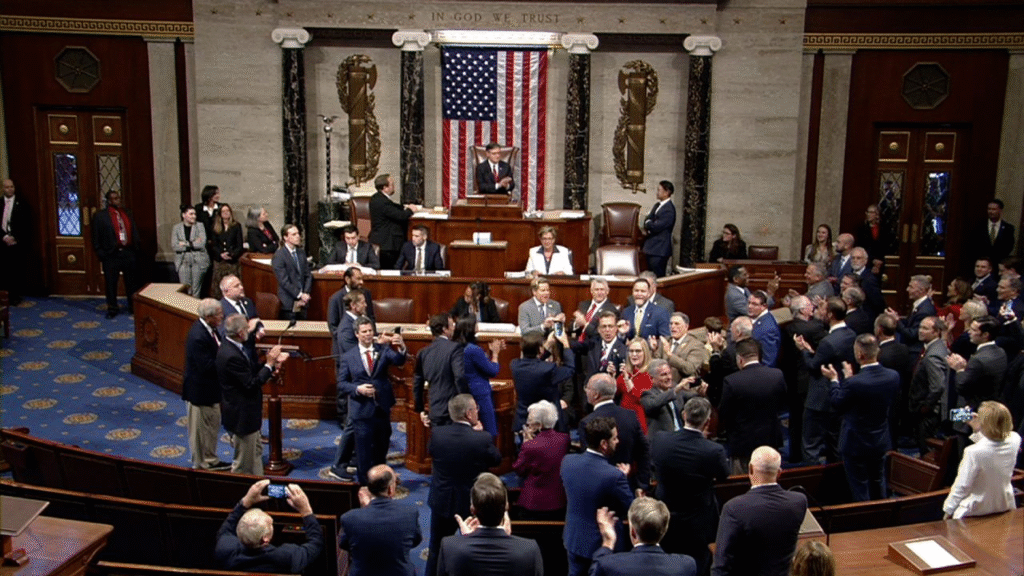WASHINGTON In a pivotal moment for US politics, President Donald Trump celebrated a major legislative victory on Thursday (Jul 3) after Congress narrowly approved his sweeping tax and spending bill a comprehensive piece of legislation that fulfills many of his second-term promises and solidifies his influence over the Republican Party.
Dubbed by Speaker Mike Johnson as the “One Big Beautiful Bill,” the 869-page legislation narrowly passed the House of Representatives with a 218-214 vote, after having cleared the Senate earlier in the week. The bill is expected to be signed into law by Trump on Independence Day, July 4, marking a symbolic moment in his administration’s efforts to reshape America’s domestic agenda.
A Radical Shift in Fiscal and Immigration Policy
At the heart of the legislation are two key pillars of Trump’s political agenda: an aggressive anti-immigration initiative and a broad extension of tax cuts introduced during his first term. The bill also allocates substantial funding for military expansion, reflecting Trump’s emphasis on defense and border security.
The legislation will channel US$4.5 trillion toward extending tax cuts widely seen as favoring the wealthy while also unlocking resources for mass deportations of undocumented immigrants. It also effectively dismantles numerous welfare and health programs, particularly Medicaid, which has served millions of low-income Americans since the 1960s.
Concerns Over Fiscal Impact and Healthcare Cuts
While Republicans hailed the bill as a long-overdue course correction following the Biden-Harris administration, critics warn that it comes at a significant human and financial cost.
According to budget analysts, the bill is projected to add at least US$3.4 trillion to the national deficit over the next decade. Additionally, up to 17 million Americans are expected to lose access to Medicaid coverage, and dozens of rural hospitals may be forced to shut down as funding dries up.
Food assistance programs will also see major reductions, leading to concerns among advocacy groups about increased food insecurity.
House Minority Leader Hakeem Jeffries, who spoke for nearly nine hours in a bid to delay the vote, described the bill as “cruel” and a “disgusting abomination” that undermines the needs of working-class Americans.
“This bill is not about helping the people. It’s a massive giveaway to the rich, done at the expense of the most vulnerable,” Jeffries said during the marathon speech.
Trump’s Consolidation of Power in the GOP
The narrow vote reflects the internal tension within the Republican Party. While fiscal conservatives were dissatisfied with what they viewed as insufficient cost-saving measures, moderate Republicans were wary of the backlash they might face for supporting deep cuts to social programs.
Yet under intense pressure from Trump and House Speaker Mike Johnson who worked late into the night to flip votes many holdouts eventually fell in line.
Trump himself has been personally engaged in lobbying lawmakers, making calls, and holding meetings at the White House to secure support. After the vote, he took to his social platform, Truth Social, declaring:
“One of the most consequential Bills ever. The USA is the ‘HOTTEST’ Country in the World, by far!!!”
The bill’s passage underscores Trump’s dominance over the GOP. Despite past divisions, the party has increasingly rallied around his policy vision, particularly as he eyes the 2026 midterms and beyond.
Democrats Eye Political Opportunity
Democrats are hopeful that public opposition to the legislation particularly its massive cuts to healthcare and welfare could help them flip control of the House in the upcoming 2026 midterm elections.
Former President Joe Biden condemned the bill shortly after its passage, calling it “not only reckless it’s cruel.”
Surveys and early reactions suggest the bill may deepen class divides, with economists noting a significant redistribution of wealth upward. Critics have also highlighted the rollback of clean energy subsidies and electric vehicle incentives, which triggered a public spat between Trump and Tesla CEO Elon Musk, once one of Trump’s top advisors.
What Comes Next?
With Trump’s mega-bill now heading to his desk for signing, the US enters a new fiscal and political chapter. Supporters view it as a long-overdue reassertion of conservative values, while detractors warn of the social costs and financial burdens that could follow.
Analysts are closely watching how the bill’s fallout will play out across key voting blocs particularly among low-income and rural voters, who stand to be most affected by the welfare and Medicaid rollbacks.
As the nation prepares for Independence Day celebrations, Trump’s administration is celebrating a different kind of declaration one of economic nationalism, immigration enforcement, and party unity behind a president determined to reshape the American political landscape.

